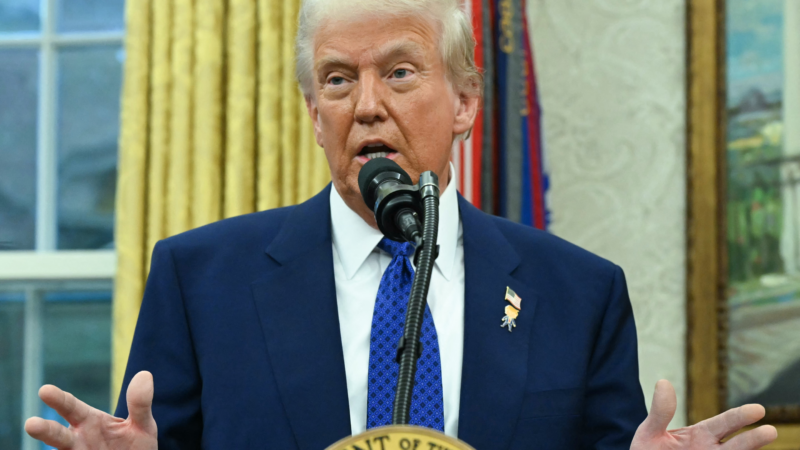Trump threatens reciprocal tariffs against other countries
President Trump is threatening a round of reciprocal tariffs, suggesting the U.S. could tax imported goods at the same level that other countries tax U.S. exports.
Trump says such tariffs would help domestic producers and reduce the nation’s trade deficit. However, economists fear the tariffs could also put upward pressure on prices, making it harder to curb stubborn inflation.
“Long-term it’s going to make our country a fortune,” Trump told reporters in the Oval Office Thursday.
Any new tariffs would add to the 25% import taxes Trump has already ordered on steel and aluminum from other countries and the additional 10% tax he’s imposed on all imports from China.
Trump also threatened taxes on all products imported from Canada and Mexico, but postponed their implementation after the two neighboring countries agreed to take steps on border security.
The burst of new import taxes comes as prices in the U.S. continue to climb faster than the Federal Reserve would like. This week the Labor Department reported that wholesale prices jumped 3.5% in the last twelve months while consumer prices rose 3%.
The U.S. typically imports more from other countries than it sells abroad. Last year, the nation ran a trade deficit of $918 billion, according to the Commerce Department. That includes a record $1.2 trillion goods deficit, which was partially offset by a $293 billion trade surplus in services.

‘Ripping off’ the U.S?
Trump often characterizes the trade deficit as a sign that other countries are “ripping off” the U.S., although most economists disagree.
“When I go to the grocery store, you know, I give them money. Are they ripping me off?” senior fellow Mary Lovely of the Peterson Institute for International Economics told Weekend Edition Sunday. “No, I get groceries in return.”
Lovely acknowledged that there may be instances in which the U.S. is at a competitive disadvantage, because other countries make it harder for American exporters to sell products there. For decades, the U.S. fought to lower those foreign trade barriers. Trump, by contrast, is responding with higher trade barriers here at home.
“This would be a really big shift,” says Chad Bown, a former State Department economist who’s also a senior fellow at the Peterson Institute. “It does reflect a bit of a frustration that the United States has felt over the last 15-20 years of a reluctance in the rest of the world to open up any further.”
Bown says U.S. tariffs on imports are typically low — averaging 2-3% — compared to 5% in the European Union and 13-14% in some developing countries. Trump has levied much higher tariffs on imports from China — now averaging around 30%. The U.S. also complains that other countries use tactics besides tariffs to limit imports.
Raising the prospect of trade wars
Other countries have promised to retaliate against Trump’s new tariffs with additional taxes of their own on U.S. exports. That raises the possibility of a costly, tit-for-tat trade war, reminiscent of the one that followed the Smoot-Hawley tariffs in the 1930s, widely seen as prolonging the Great Depression.
“If the United States decides to raise its tariff basically just to match another country’s tariff, that country doesn’t just sit there idle and say, ‘Ah, OK, that’s the new world. We’ll agree to that.'” Bown says. “They will then raise their tariff even further. And then you see sort of an unwinding, unraveling of international trade. That’s going to be tough not only for the United States’ economy but potentially for the global economy as well.”
Former Senator Phil Gramm, R-Texas, and former Treasury Secretary Larry Summers co-authored an op-ed in the Wall Street Journal last month, warning against widespread tariffs.
“Tariffs are harmful to the economy,” the bipartisan pair wrote. “Productivity, wages and economic growth fall while prices rise. Tariffs and the retaliation they bring also poison our economic and security alliances.”
Taiwan’s president pledges to defend island’s sovereignty after Chinese military drills
Taiwanese President Lai Ching-te vowed to defend the self-ruled island's sovereignty in the face of what he termed China's "expansionist ambitions," days after Beijing wrapped up live-fire military drills near its shores.
Deaths reported during widening protests in Iran sparked by ailing economy
The protests began due to economic pressures, with Iran's currency rapidly depreciating. Demonstrators have also chanted against the country's theocracy.
Congress failed to extend Obamacare subsidies. This Democrat says Trump can save them
Sen. Peter Welch, D-Vt., says he thinks the Senate can pass a "retroactive" Affordable Care Act subsidy extension, but "we need President Trump."
Rideshare union rights, social media limits and other state laws taking effect Jan. 1
Every new year, public media reporters across the country bring us some of the new state laws taking effect where they are. Here are six in 2026.
Guides to help you tackle your New Year’s resolutions
From building your strength to tackling credit card debt, NPR's Life Kit has a newsletter journey to help you tackle your New Year's resolution.
Guides to help you tackle your New Year’s resolutions
From building your strength to tackling credit card debt, NPR's Life Kit has a newsletter journey to help you tackle your New Year's resolution.






